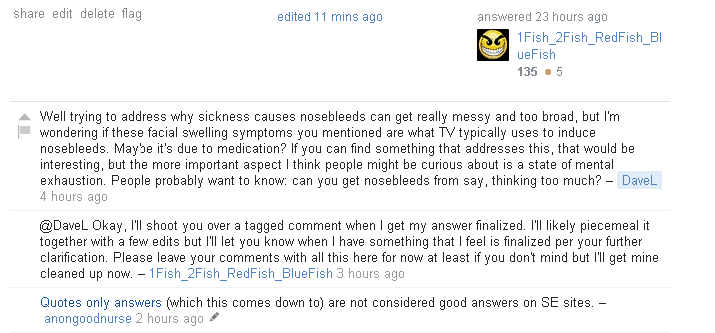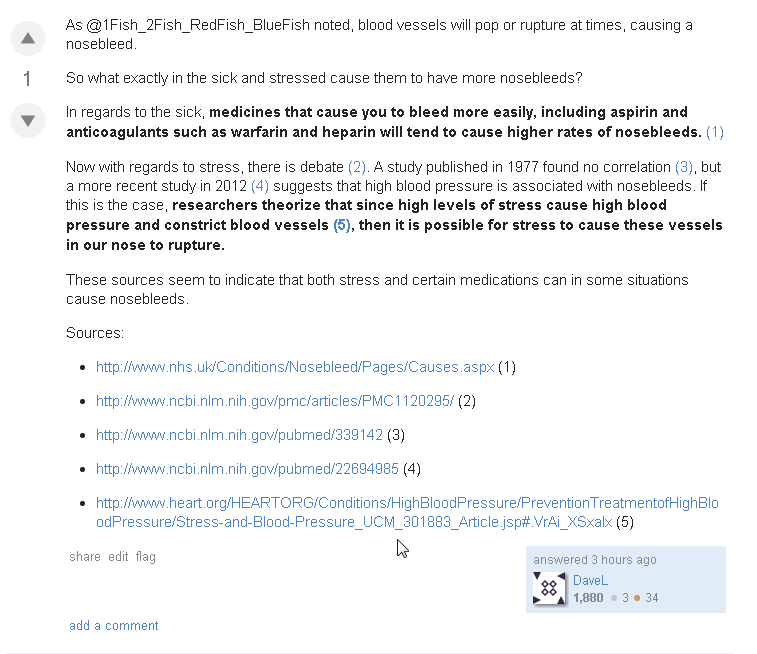I'm curious where the line is drawn by what is interpreted as quotes only answers and how the method of quoting used it interpreted as being quoted only by some people it seems.
UPDATE: After getting more feedback I decided to delete my answer, but originally I'll copy my final edit below in the fully quoted part of this question which I started to update and had to step away from for a while (see screen shot of my comment to the OP). When I came back I saw the comment on my non-finalized answer by @anongoodnurse with a Meta post to quoted only answer not being good answers, etc.
This comment was made 2 hours ago on my post but then there was DaveL's answer that was there (3 hours ago) with with a mainly quoted only answer as well with no comment from this person about his quoted only answer which is a little differently quoted format wise that the method I used to format my quoted or referenced answer.
Here's the comment on my answer
(you'll have to look at the edit history to see what it looked like before I updated it at this time though before I finalized)
Here's DaveL's answer
Note all (1) - (5) parts of this answer are quoted or referenced yet no comment by the complainer on this when this answer was obviously there too when it was decided to suggest I need to read a Meta post about quoted only answers not being good answers but not any comments with this respect for DaveL's answer.
My Question or Concern
So I guess I'm wondering if I'm being scrutinized here in a bias type manner and if so would it be based on perhaps the rep I have versus the other answerer, is it truly a matter of the complainer interpreting my quoted references differently versus the method DaveL used, or what's going on here?
The point is, what I had and what DaveL had were both quoted or referenced answers only and these were both there already at the time anongoodnurse put the comment on my post so I'm not sure why there's a concern with the way I quoted the references to the source I got the information from versus the way DaveL posted his. I'll be glad to change the way I reference sources and not used the HTML quote tags if that does away with concern at this level if it's all a matter of the method I used.
My Deleted Answer
Why do people get nosebleeds from overexerting themselves or when they're sick?
Short Answer
ANSWER (stress)
As pointed out in the answer provided by @DaveL and a few great sources he found, it appears there is some debate in the medical community whether or not stress is a direct trigger of nosebleeds but it's certainly at least an indirect cause due to other conditions or [medications] chemicals one is exposed to for managing these conditions (e.g. blood pressure meds, anti-anxiety meds, etc.).
What some research suggest is that high blood pressure, medication taken to help manage stress and side effects of stress; such as high blood pressure and medications, etc. that these may be contributing to the nose bleeds more directly than the actual stress itself.
Sources
Long Verbose Answer
An accurate answer to your first question needs some basic understanding of the usual types of nosebleeds, so here's a good source explanation and I'll quote the relevant parts.
In general though, there are two classifications of nosebleed; anterior nosebleeds and posterior nosebleeds.
The anterior nosebleeds are more common per a group of vessels in the nose that can become delicate and easily disturbed.
The posterior nosebleeds are less common and come from an artery in the back of the nose and these are harder to manage.
Nosebleeds most often come from the front of the septum, the cartilage that separates the nose into two nostrils. These anterior nosebleeds comprise 80 percent of all nosebleeds. A mass of blood vessels, called Kiesselbach's plexus, lie on either side of the septum. These blood vessels are easy to injure and bleeding can occur.
Posterior nosebleeds, which come from the back of the nose, are less common and much harder to manage. Bleeding usually begins in the upper part of the nose and flows toward the throat and mouth where it is swallowed. It is difficult to determine how much blood is lost in these nosebleeds.
Ultimately, how does the nosebleed typically occur?
Some of the common causes of nosebleeds in general come down various to sicknesses, injuries , or chemical irritations. Basically it comes down to a group of blood vessels inside your nose that are often delicate and easy to disturb. Once distrubed, bleeding from those vessels occur and thereby you get a nosebleed (see below for quoted source as well).
ANSWER (sickness, injury, chemicals)
The most common cause of nosebleeds is injury from picking or blowing the nose. People with respiratory allergies , hay fever, and sinus infections have swollen nasal membranes that are fragile and more likely to bleed. Physical injury to the nose from falls, sports , or fighting can also cause nosebleeds. Chemical irritants such as cleaning products, aerosols, and paint can irritate the nose, sometimes resulting in nosebleeds. In addition, some drugs, such as cocaine, inflame the nose, causing it to bleed. Children with deviated septums or crooked noses are also prone to nosebleeds.
Another cause of nosebleeds can be related to strenous exercise or overexerting oneself with physical activity. This too basically comes down to a group of blood vessels inside your nose that are often delicate and easy to disturb. Once distrubed, bleeding from those vessels occur and thereby you get a nosebleed (see below for quoted source as well).
ANSWER (strenous exercise, physical activity)
A nosebleed can occur from something as simple as blowing air too hard out of your nose. This can occur when you are exercising because you tend to breathe harder than you do in your everyday activities. Intense straining during exercise also can disturb the delicate blood vessel lining and contribute to a nosebleed. Also, the environment you are exercising in may cause a nosebleed because exercising in dry, cold air is associated with greater risk for nosebleeds because the air dries out your nasal passages and makes them more vulnerable to damage.

